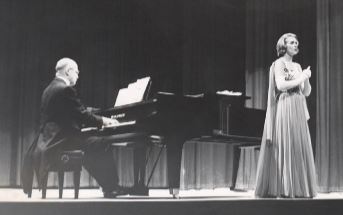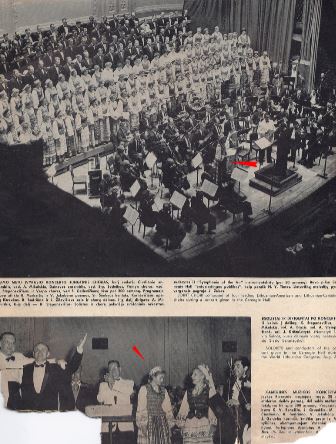The Voice of Aldona Stempužis Preserved for Future Generations
The voice of Aldona Stempužis, the renowned Lithuanian mezzosoprano, whose impressive career spanned decades, has now been preserved for future generations.
Her multifaceted musical career began with the Čiurlionis Lithuanian National Art Ensemble in postwar Germany, and progressed in the United States where she sang leading operatic roles, sophisticated interpretations of traditional Lithuanian folk songs, and avantgarde works of contemporary Lithuanian composers. Her performances, many recorded on audiotape, constitute a significant archive of post-war Lithuanian music and its cultural history in the United States.

Aldona Stempužis’ first concert as a solo vocal artist. Lithuanian Youth Center in Chicago, October 26, 1963
Unfortunately, magnetic tape deteriorates. Even if stored under ideal conditions, the medium can become brittle causing audio information to drop out. The singer’s son, Linas Stempužis, understanding the value of his mother’s sound recordings, realized that the only way to preserve this audio archive was to transfer it to a digitised format. Thus began an exhaustive and systematic four-year project, which resulted in the digital version of the entire Aldona Stempužis archive. The archive encompasses not only Stempužis’ concert performances but also program books, photos, and related concert materials. Aldona Stempužis was closely involved in this project, supplementing the existing material with recollections, stories, and critical background information.
The value of this personal archive cannot be overestimated. It not only preserves the works of Aldona Stempužis, but also offers insights into the dynamic musical culture of the Lithuanian American community. Most of all, it underscores the unrelenting yearning of Lithuanian Americans to retain their culture as a means of restoring a free and independent Lithuania. This is apparent when one reviews the milestones of Aldona Stempužis’ musical career.
Aldona Stempužis was born in 1926 in the village of Skirsnemunė on the banks of the legendary Nemunas River in Lithuania. From an early age she sang in local choirs. Taking note of her apparent talent, her parents planned to move to Kaunas so she could study at the Juozas Gruodis Conservatory. Aldona’s dream was to one day sing in the Kaunas State Music Theatre.
All hopes, however, were shattered with the onset of World War II. Her father was arrested and deported to Siberia during the first Soviet occupation in 1940. When the Soviets occupied Lithuania again in 1944, Aldona and her family had no choice but to flee from the approaching Soviet army.
After the war ended, Aldona set her sights on joining the esteemed Čiurlionis Lithuanian National Art Ensemble in Germany. Competition was fierce, especially since membership offered free room and board. After several auditions, Aldona was selected as a dancer, and soon began to perform as a vocalist as well.
Given the economic instability and social upheaval brought on by the war, the ensemble lasted only a few years in Germany. With the growing shortage of food and supplies, relief services urged refugees to emigrate from Germany. Aldona’s mother had two sisters living in New York, who sponsored the Stempužis family and helped them secure residence in the United States. Within a few days of arriving in New York, Aldona was already employed, not as a singer, but as a labourer in the local chocolate processing facility. She was determined not to be a burden to others.
By 1950 the Čiurlionis Lithuanian National Art Ensemble successfully regrouped in Cleveland, Ohio, and Aldona was invited to join. Aldona was also active in numerous competitions. In 1955, she was awarded “Best Woman Vocalist of Ohio”. She also won the Silver Medal in the vocal competition at the Chicagoland Music Festival.
Aldona’s talents were noticed. She was invited to perform at several important venues. On August 31, 1958, she performed with the Čiurlionis Ensemble at Carnegie Hall during the World Lithuanian Community Conference in New York City. This concert presented Aldona Stempužis as an emerging artist to the Lithuanian émigré audience. Here, she established much needed contacts with known Lithuanian performers, composers, and community leaders.
The concert that had the greatest affect on Aldona was a performance of Verdi’s Requiem and Bruno Markaitis’ The Bells of Vilnius on June 13, 1965 at the Arie Crown Theater in McCormick Place, Chicago, Illinois. This concert was a solemn commemoration of Lithuania’s 25-year struggle against the Soviet occupation. Aldona performed with members of the Lithuanian Opera Company of Chicago and the Chicago Symphony Orchestra. This performance received a glowing review from the Chicago Tribune.
With Lithuania shackled behind the Iron Curtain, Aldona served as an ambassador for its freedom by introducing Lithuanian culture to the world. One of her most memorable concerts was in Bogota, Colombia on October 28, 1960. She performed classical and Lithuanian songs with tenor Stasys Baras (Baranauskas) at the Teatro Colon. The Orquesta Sinfonica de Colombia with Olav Roots conducting accompanied them. At the reception, much to Aldona’s surprise, the members of the orchestra pulled out their instruments and played an old Lithuanian shepherd song ‚ “Piemenų Raliavimas.”
Aldona Stempužis frequently sang lead roles with the Chicago Lithuanian Opera Company reprising such roles as Carmen, Aida. In the 1960s she expanded her repertoire by collaborating with the promising young composer Darius Lapinskas, known for his contemporary and experimental music. Later she worked with the famed Lithuanian composer Jonas Švedas.

Juratė and Kastytis: Opera performed on September 17, 1996 in Kaunas, Lithuania with members from the Lithuanian Opera and the Chicago Lithuanian Opera Company. Aldona Stempužis [as The Mother] singing with Virgilijus Noreika who played the role of Kastytis. Photo by Jonas Dainiūna It was only in 1989, that Aldona returned to her homeland for the first time after the war. A special homecoming concert was organised in the capital city of Vilnius, where other soloists and choristers joined her. Music of expatriate Lithuanian composers was exclusively featured at this performance.
It was only in 1989, that Aldona returned to her homeland for the first time after the war. A special homecoming concert was organised in the capital city of Vilnius, where other soloists and choristers joined her. Music of expatriate Lithuanian composers was exclusively featured at this performance.
Aldona’s childhood dream, to sing at the Kaunas State Music Theatre, was finally realised in 1996. She sang in Kazimieras Banaitis’ opera “Jūratė and Kastytis”, which was performed by the Lithuanian Opera Company and included members of the Chicago Lithuanian Opera Company. It was a full house and the performance culminated with a standing ovation at the final curtain call.
Aldona kept a detailed account of all these events, which can be now be found in her archive.
Linas Stempužis is considering placing the archive online and making it available to the vast Internet audience. “This is an important aspect of our lives, as there is such a need to remember our past, especially the recent past, and to pass its richness on to future generations”.
He hopes the archive can serve as a preservation prototype for similar projects such as family histories. In addition such archives serve to document a particular generation, belonging to a specific time and a place. According to Linas, these small-format archives might be more easily accessible to people who hesitate to visit large archives, but still want to know the history of their community.
When available online, the archive will accessed from: www.aldonadiva.com.
Helga Merits
